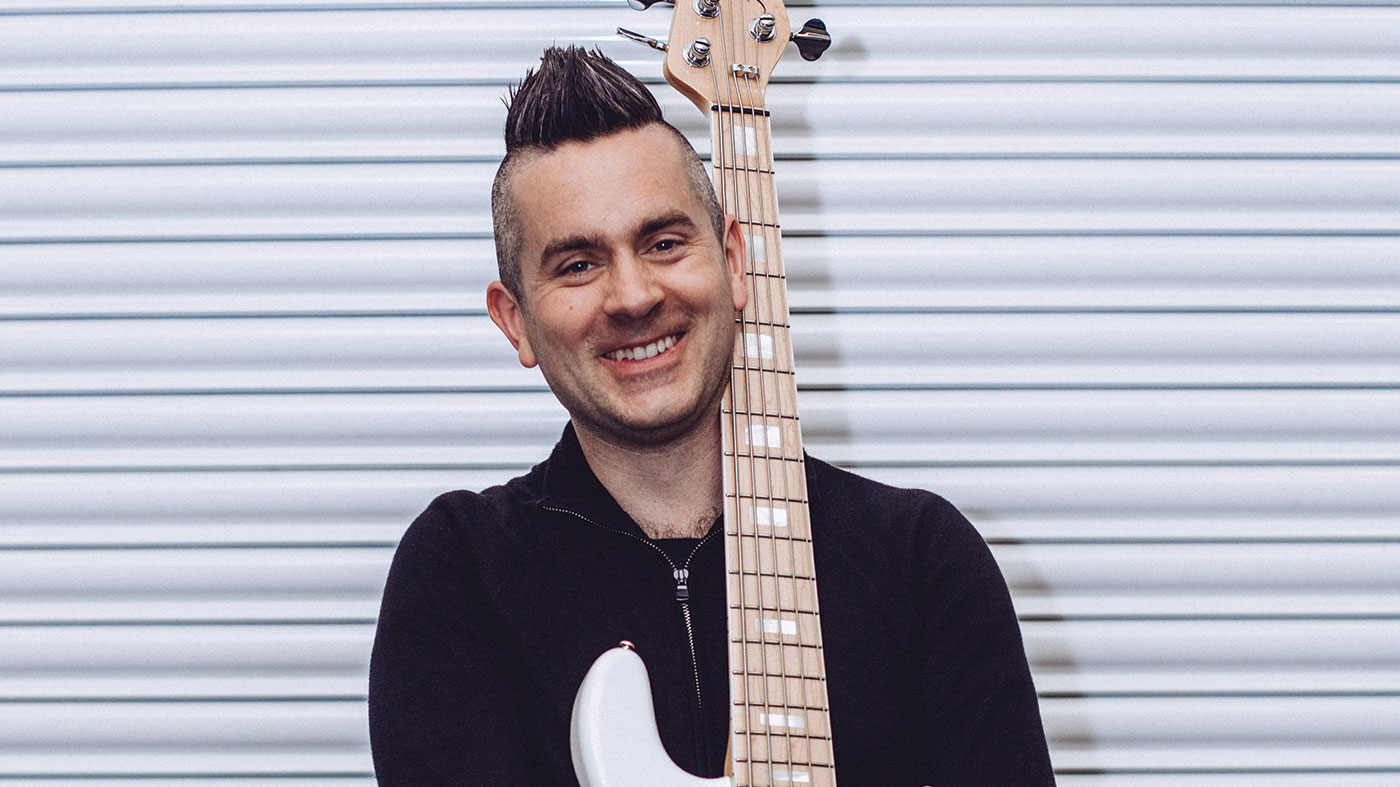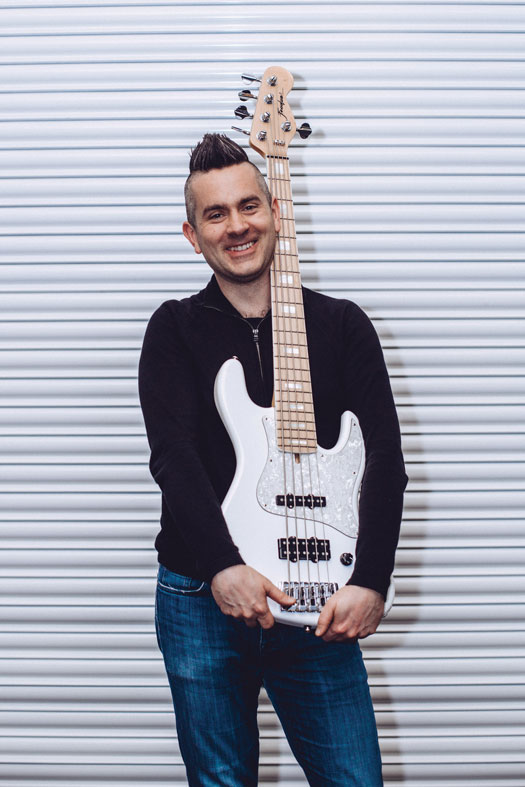Dave Marks: “I get parachuted into a lot of gigs and it’s never a soft landing”
The session man and producer on his multifaceted career

Dave Marks is a session and stage bassist, festival organiser, educator and writer. We ask the great man how he gets it all done…
We catch up with the splendid Dave Marks while he’s on tour with Deep Purple keyboard player Don Airey in Great Yarmouth. “The event is called Legends Of Rock, which we’re headlining,” says our chap. “Ironically, we’re the only band that isn’t a tribute act!”
Marks has built a reputation as bass-man to trust with a host of stellar artists - Carl Palmer, Albert Lee and the late Rick Parfitt among others - so we’re not surprised to hear that he’s occupying the top slot with Airey. Give us a bit of career history, fella?
I practised bass for eight hours a day at college, so the Carl Palmer gig was right up my alley
“I grew up in Belfast and was there until I was 18,” he says. “I started playing guitar when I was about 12 or 13. I then got into bass when I was in a rock covers band, and moved to London when I was 18 to go to what was then Basstech and is now the ICMP, and studied there for three years. I loved the college thing, and went to every jam session I could, playing jazz tunes really badly. We knew it sounded crap, but we also knew that we had to go through this in order to get good, and when college finished I was recommended for Carl Palmer’s tour as my first professional gig.”
For those not in the know, Palmer is the P in ELP, the legendary prog-rock band Emerson Lake & Palmer. That must have been a fairly challenging debut gig, we suggest.
“It certainly was. Between guitar, bass and drums we had to recreate songs that ELP had done with Keith Emerson’s organ and even an orchestra, which is how I got into using effects as well as tapping and chordal stuff - anything I could do to deliver the goods. I loved it; my chops were as good as they’ve ever been, because I practised bass for eight hours a day at college, so the gig was right up my alley.”
Multi-talented
So what else is Marks up to these days? “My time is broken into several things,” he tells us. “First, gigs; I get parachuted into a lot of gigs and it’s never a soft landing. I’ll have three days to learn the whole set, with no rehearsals. For this one, though, I had a whole week, plus two rehearsals, which was incredible, but typically that won’t be the case. I usually do three or four projects of that kind a year - Wishbone Ash called me a while back, and I’ve played with Hans Zimmer too. Typically, a call will come out of nowhere, because a particular bass player can’t make a bunch of gigs, so I show up and do them.”
Want all the hottest music and gear news, reviews, deals, features and more, direct to your inbox? Sign up here.
Sounds good to us, we say. “It is! It works for me, because a lot of bands need someone who will learn the music, come in without making a fuss, and do the show. I love it because it’s all a honeymoon period; you’re not in the band long enough for anyone to fall out, and the craic is great. I just smile and head off home.”
When I’m at home I do studio stuff. I’m producing Simon McBride at the moment. He’s an astonishing, world-class musician
What takes up Marks’ time when he’s not on stage? “When I’m at home I do studio stuff. I’m producing Simon McBride at the moment, who has a five-album deal with Edel in Germany, so that’ll be a focus for me for the next three to five years. Simon was a child prodigy of a guitarist when I was growing up in Belfast. He’s an astonishing, world-class musician. He’s also doing the Don Airey gig and he worked with Purple’s singer Ian Gillan last year.”

All that would add up to a sufficient workload for most of us, but Marks has more up his sleeve:
“My wife and I also run a three-day pop festival in St Albans called Meraki, which is hilarious, because I’ll play bass in the house band and then literally leap off stage to go and fix a broken water main, or whatever. It’s on 10 to 12 August this year and we’ve got Pixie Lott, Nik Kershaw, All Saints and a ton of artists and DJs playing. And on top of that we run a virtual reality show in the tech world.”
As for original music, Marks has a mission to fill a particular gap in the market. “I have a project called Belfast Bullfighters, which has been ongoing over the last few years. It’s Celtic fusion, that’s the best way I can describe it. I used to listen to a lot of Irish music when I was growing up, and I was always gutted by how lame the rhythm sections were. You know, Uncle Mick would be playing bass, or whoever, and there were barely any drums.
“So I got Darby Todd in on drums, who is a monster, and a bunch of guest guitarists like Guthrie Govan and Simon McBride. It’s really fulfilling to write in that idiom, whether it’s three-minute reels or longer, almost prog pieces that go off in a Pink Floyd ambient direction, but with Celtic instruments. The next step is to expand it to include singers. It’ll be the King Crimson of fiddly-dee music!”
Rig talk
What gear does he use to make the big noises at all these gigs? “I’ve been using an EBS rig for the last 14 years. Other companies have come along in that time and asked me if I’d be interested in endorsing them, but EBS make such amazing gear and have been so good to me that I’m not tempted. There’s nothing out there that is an improvement on the rig that I use.”
Which EBS is it? “I use Marcus Miller’s rig; I went and saw him at the Jazz Cafe when I was interviewing him for the cover of BGM back in 2004. Marcus had two rigs, a 1x15, a 2x10 and a TD650 head. I tested that rig out and I’ve never heard a better one, and I’ve played them all, believe me. Lots of them are really good but I haven’t found one that is better. My cabs are neodymiums so they’re easy to carry.”
Bakithi Kumalo played my Jazz and asked me how much I wanted for it. If someone like that wants to buy it, that makes me think I shouldn’t sell it!
And bass guitars? “It’s Marcus again - a white Marcus Miller Fender Jazz. I used to have two Sei headless six-strings, fretted and fretless, which I got for the Carl Palmer tour in 2001 right after coming out of college, because the gig was very chops-based and technical. I later realised that if I wanted to do pop gigs, showing up with those basses wouldn’t go down too well! It’s funny, I thought it was just a standard Marcus model, but it turn out that it’s quite a special one; I was at NAMM and Bakithi Kumalo played it and asked me how much I wanted for it. If someone like that wants to buy it, that makes me think I shouldn’t sell it!”
He adds: “I also have a Precision, and four- and five-string Music Man Stingrays, specifi cally because I played in a Rage Against The Machine tribute band last year. To me, basses have to be the right tools for the job, regardless of which ones I’d like to play. I like a modern, active sound which allows me to dial in a lot of brightness, because I do a lot of pick playing these days. A lot of boutique basses don’t stand up to being thumped; they seem to choke a little when you really lay into them.”
As for effects, Marks is a man of many sounds. “An EBS Multicomp, an Octabass, and a Multidrive are the first three pedals in my chain on everything I do,” he tells us. “I don’t need a wall of distortion; I just use it to make the sound a bit creamy, bring the harmonics up a bit and thicken the sound, perhaps on the last chorus of a song where it needs a lift.
“I also have an EBS Fuzzmo, which is discontinued now, and if I’m biamping - as I do on Simon’s gig - I use a GigRig switcher, which splits the signal to a guitar rig and a bass rig. The guitar parts go through an EHX Pitch Fork pitch-shifter, which sends them up an octave, and then through an EBS drive pedal and sometimes a TC Electronic Flashback delay, so it sounds like a guitar and bass doubling up. It’s an ongoing quest to get the perfect split signal, and I know Tim Commerford from Rage and Mike Kerr from Royal Blood are looking for the same thing.”
If anyone can complete this noble quest, Marks can. He’ll find the time somehow. Who needed sleep anyway?

